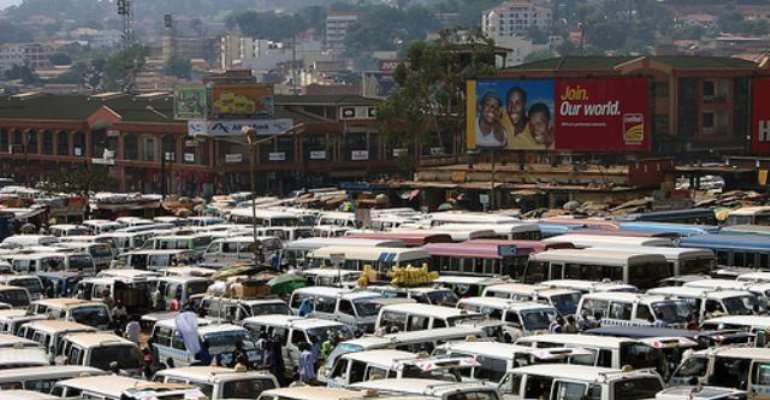Please introduce Commuters in Kampala City

Dear editor,
While I would like to agree that regional development is very important and I support every one to develop their own regions, I can't see how this can affect negatively the development of a capital city or commercial city such as Kampala. Kampala is apparently so jammed because there is nothing like public transport in Uganda. Brother Alhajji Sebagala who is the current mayor of the city, had promised commuter buses or city buses in his manifesto while campaigning to become a mayor but I have never personally seen them.
The increasing number of car users in Kampala is causing a lot of problems for everybody in the city and that is why we need an immediate introduction of public transport like commuter trains. Nevertheless, the population in Kampala will just keep growing despite the developments taking place anywhere else in the country. For instance, the population of London has been increasing despite the fact that UK has now got other larger cities such as Birmingham, Leeds, Manchester and Liverpool with almost everything or same services as that in London. These other cities some times act as the 'magnets of investment' for themselves and later on London thus creating some form of parasitic relationship among cities.
In a similar vein, preference for public transportation is higher when commuters believe that it is less environmentally damaging than the car. At the moment, all the environmental activists like Ken Lukyamuzi have somehow kept quite about the increased use of cars in Kampala and how much these old cars are destroying the environment. When I was in Kampala in 2009, I was surprised to find that almost all the people I considered friends were driving or owning cars and they could do anything to make sure that I see their cars, but some of their cars were too old to be on the road but nobody cared. There is a generally lot of 'showing off' with cars in Africa and I think I understand where it is coming from.Most Africans have been born out of poverty and cars have always been a luxury. Basically, the issue of the environment and cars needs to be addressed because it is casusing a lot of problems to the country.
In addition,the population in Kampala is not gonna go anywhere because of the introduction of public means of transport such as trains. Kampala will keep growing and expanding- whether the central government takes over the city management or not, or whether Soroti or Gulu becomes another city or not. Kampala is similar to India's Mumbai in a lot of ways.For instance,the growth of other cities in India has neither reduced the population of Mumbai nor affected its development negatively. By 1990, Mumbai was the world's sixth most populous metropolitan centre and it also generates more wealth, both through production from its industrial base, now mainly on the outskirts of the city, and from its service sector, than many cities in India put together. The city produces 10 per cent of India's industrial output, handles 60 per cent of the maritime trade, accounts for 33 per cent of total income tax collection and 60 per cent of customs duty, and has the single largest share of the services sector. It registered an employment growth of 59 per cent between 1971-91.
Mumbai has grown from an island city – or rather a city that grew out of the joining together of seven islands – into a vast urban agglomeration .Similarly Kampala is a product of joining together several hills though some people want to extend its official boundaries for reasons best known to themselves, an issue that has raised some storm between the central government and the Buganda kingdom.
Unlike Kampala, Mumbai is served by five railway corridors. All originate in the south of the city and then branch out to the north and north-east. The government there encouraged people to use public transport to beat the traffic jam such that an incredible 88 per cent of all travel in Mumbai is by bus and rail. This statistic in itself illustrates the popularity and the necessity of the public transport system, particularly the railways.
The trains can carry four times the traffic load of city buses in terms of passenger kilometres of travel. The local trains carry 5.5 million passengers every day. Although the normal capacity of each train is 1,700, at peak hours more than 4,000 people crowd onto them. On a typical day, according to the Mumbai Metro Planning Group study, Western Railways operate 923 trains and Central Railways 1,072 trains. During the peak period between 9 and 11 am, 118,000 passengers.
Please let us encourage our government to start investing heavily in public transport such as commuter trains or buses in cities because it will help reduce the problems in Kampala. I remember listening to FDC's Dr. Besigye one time on KFM radio in 2005 and he was promising Ugandans a modern railway system across the country if elected in power. How i wish Ugandans had put him in the Statehouse then than being stuck with the current mess in Kampala.
Byebyo banange
Abbey Kibirige Semuwemba
United Kingdom
--
Abbey Kibirige Semuwemba
Blogs:
http://ugandansatheart.wordpress.com/
http://semuwemba.wordpress.com/
http://ekitibwakyabuganda.wordpress.com/
